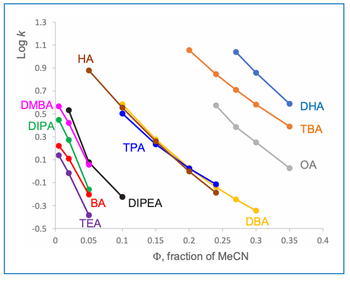
Adjustable Polyacrylamide Stationary Phases Enhance Separation Performance in Liquid Chromatography
Adjustable polyacrylamide stationary phases developed by researchers enhance separation performance in liquid chromatography, according to a recent publication. The study demonstrates the synthesis of vinyl modified silica and the successful preparation of polyacrylamide modified silica (PAM-SIL) stationary phases, allowing for fine control of separation performance.
Scientists from the Dalian Institute of Chemical Physics, Chinese Academy of Sciences, and King Abdullah University of Science and Technology have developed a method to enhance the performance of hydrophilic-interaction chromatography (HILIC) by utilizing adjustable polyacrylamide stationary phases. Published in the Journal of Chromatography A, the study details the synthesis of vinyl modified silica and the successful creation of polyacrylamide modified silica (PAM-SIL) stationary phases through free radical polymerization using acrylamide as a copolymer monomer (1).
PAM-SIL stationary phases HILIC refers to a specialized type of chromatographic material used for separating polar analytes based on their hydrophilic interactions with the stationary phase. In this approach, a vinyl modified silica material is synthesized and subsequently subjected to free radical polymerization using acrylamide as a copolymer monomer. This process results in the formation of a polyacrylamide layer on the silica surface, creating a hydrophilic stationary phase with adjustable performance. PAM-SIL stationary phases offer enhanced separation capabilities and can be tailored by controlling the polymer structure, allowing for precise modulation of retention behaviors and separation efficiency in HILIC applications.
The research team extensively investigated the retention behaviors of polar analytes on the PAM-SIL stationary phases under various chromatographic conditions, including acetonitrile content, buffer concentration, and pH values. The results revealed a hydrophilic interaction retention mechanism, and importantly, demonstrated that the separation performance of the stationary phases could be finely controlled by adjusting the polymer structure.
Notably, the stationary phase with an optimal grafting amount of vinyl exhibited rapid separation of model analytes, achieving an impressive number of theoretical plates, with orotic acid (uracil-6-carboxylic acid) reaching 119,966/m. Conversely, the stationary phases with higher acrylamide concentrations displayed enhanced retention behavior and higher resolution for analytes. This adjustable separation performance holds immense potential for future applications in separation and analysis.
The ability to customize the separation performance of stationary phases in HILIC is of great significance in the field of analytical chemistry. By precisely optimizing the polymer structure, scientists can tailor the stationary phase to meet specific separation requirements, leading to improved resolution and efficiency. This innovative approach paves the way for the development of highly efficient and adaptable chromatographic methods in various domains, including pharmaceutical analysis, environmental monitoring, and biomolecular research.
The findings of this study not only contribute to the fundamental understanding of hydrophilic interaction chromatography but also offer a practical and versatile solution for enhancing separation performance. The adjustable polyacrylamide stationary phases present a promising avenue for advancing liquid chromatography techniques, enabling researchers to achieve more precise and reliable separation of complex mixtures. As the field of chromatography continues to evolve, this groundbreaking approach has the potential to revolutionize analytical methods and expedite scientific discoveries across a wide range of disciplines.
Reference
(1) Wang, X.; Cui, J.; Zhou, J.; Wang, S.; Gu, Y.; Liu, X.; Wang, S. Preparation of polyacrylamide hydrophilic stationary phases with adjustable performance. J. Chromatogr. A. 2023. 1702, 464065. DOI:
Newsletter
Join the global community of analytical scientists who trust LCGC for insights on the latest techniques, trends, and expert solutions in chromatography.




